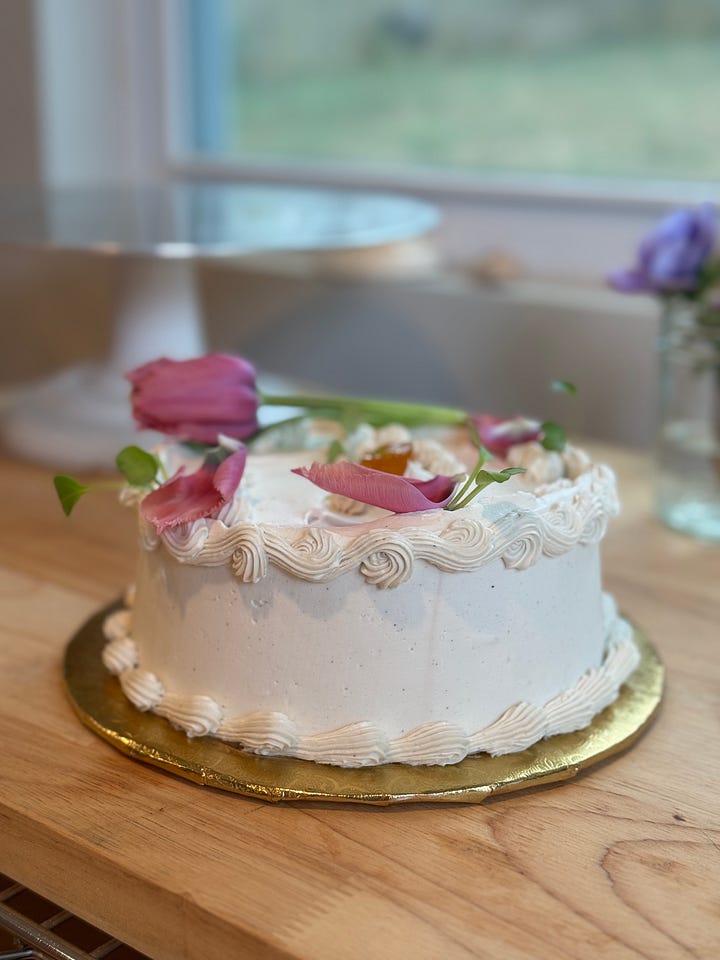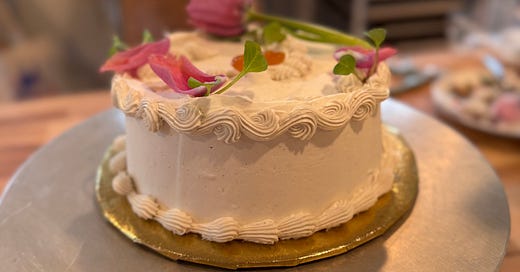I’ve been entertaining a fantasy since last year. In the fantasy, it’s winter and I’m swapping the good local eggs I use in concha dough for roasted sweet potatoes. The silky Swiss meringue buttercream I make from the good local egg whites are replaced with aquafaba, the same organic cane sugar as always, and a combination of Miyokos and butter-flavored shortening to stiffen things up. From late fall until daffodil buds push up from the dormant winter ground—one of the first signs spring is around the corner here in Atlanta—At Heart operates as an egg-seasonal bakery. This is the fantasy.
Now spring has rolled around in the bakery of my daydreams. Redbud trees and cherry blossoms come alive again, as do everyone’s allergies. At the bakery, the egg and all its various forms is celebrated with fervor. I wait all year for this. On the menu in the springtime, before the humidity gets to be unbearable and impractical for meringue, are pavlovas (good, local egg whites) layered with canary yellow citrus curd, ruby red strawberry and then stone fruit jams, vanilla bean pastry cream (good, local egg yolks) lightened with stabilized whipped cream. A confetti of edible flower petals covers everything in the pastry case. In the bakery of my daydreams, spring signals a resurrection of the egg.
“Today, there’s never been a worse time to be a chicken,” Tove Danovich wrote in Under the Henfluence: Inside the World of Backyard Chickens and the People Who Love Them1. I cried many times reading this book. I considered myself generally in-the-know about the horrors of industrial farming, but actually I barely knew anything. “We have a seemingly unlimited supply of eggs because the egg industry retires and slaughters hens when they pass prime laying age of one and a half to two years old,” Danovich writes in the first chapter. She writes about The Humane Methods of Slaughter Act—another fact of industrial farming about which I was ignorant—which “requires all animals ‘be rendered insensible to pain’ before being shackled or killed—all animals except poultry.”
The details may have only in the last few years entered into my consciousness, but the general cruelty embedded in industrial agriculture is why I’ve always paid more for local eggs. As egg prices have seen a 157% inflation rate in 2025 due to avian flu, it’s not uncommon for me to pay upwards of $7 or $8/dozen. But lately I have questions for myself.
Last month for Lent2, I quit cold turkey one of my vices I’d been partaking in for over a decade. Lent was the catalyst, but I’ve been itching to make the change for years. Always unsure if I could actually follow through. I’ve not been sleeping well since I quit3, but I’ve noticed how doing one good thing for myself has been like a chain reaction. I finally stopped eating meat, another life choice I’d been annoyingly toying around with for years. These questions I have about my relationship with eggs is coming at, I suppose, the right time. And so I’d like to know, self, if spending a large chunk of my bakery income on good, local eggs is doing enough?
“Eaters must understand that eating takes place inescapably in the world, that it is inescapably an agricultural act, and that how we eat determines, to a considerable extent, how the world is used.” Wendell Berry
For breakfast, when I have my way and also time, I like to soft scramble two or three eggs. Three is usually too many but I never seem to remember, my appetite being more influential than memory in the moment. I whisk a splash of cream into the eggs with a fork then cook on low with a pad of butter, unsalted. I wake up ravenous most mornings. My body seems to crave richness in exchange for having to get out of bed. Gently pushing and swirling the egg and cream mixture with a rubber spatula, I wait until the end of cooking, when the eggs have just begun to set, to add the cracked black pepper and kosher salt.
The eggs, now doused with salsa or hot sauce, are destined to sit atop a chunky slice of sourdough that I’ve pan fried in olive oil. Both are destined for my plate. The slightly bitter coffee with oat milk and brown sugar, plus wedges of fresh blood oranges or mandarins rounds out my ideal breakfast. This isn’t fantasy, it’s just a morning meal I get to enjoy when there’s time and I feel like cooking.
I spoke to a local reporter last month who was writing a story about how Atlanta restaurants and pop ups were dealing with egg prices. “We don’t know what’s in store with avian flu, and I see no reason to not be worried about it,” I told her. My indulgent soft scramble breakfast comes to mind because well, I fucking love a soft scramble made from good, local (and this is supposed to mean “happy”) chickens who have hatched their happy little eggs for people like me. I don’t want to give it up or live without good eggs. But, how long until bird flu comes for even the small Georgia farms that are doing things seemingly right? Those chickens are allowed to roam and live ostensibly better lives than the birds whose fate is an industrial farm without sunlight at “best” and at absolute worst, a violent death. But for how long? And why stop at eggs, self? What about dairy?4 What is my responsibility as a person who runs a bakery that feeds the public?


Until I started At Heart and was working with eggs on a much more frequent basis, I didn’t realize they were at one time a seasonal food. Knowledge that’s generally unknown in the public consciousness, although my ignorance embarrassed me then as it does again now.
Wendell Berry reminds me in Bringing It to the Table: On Farming and Food, that a “cultural amnesia” of where the food of our plates literally comes from is by design. “When food, in the mind of eaters, is no longer associated with farming and with the land, then the eaters are suffering a kind of cultural amnesia that is misleading and dangerous.” Out of sight, out of mind even on the plate.
I highlighted and underlined this part from the same essay: “Eating with the fullest pleasure—pleasure, that is, that does not depend on ignorance—is perhaps the profoundest enactment of our connection with the world.” I wonder if I’ve mistaken my egg-seasonal fantasy for what it actually could be: a visualization of what’s possible. Maybe a visual representation of my responsibility. As a baker who feeds the public. As someone who believes down at the cellular level that a better world is in fact very possible. If I can imagine it—and I can, with technicolor vision akin to Dorothy crash landing in Oz—don’t I have a responsibility to try living it?
I, truthfully and selfishly, don’t want to bake completely without eggs just like I don’t want to give up my soft scramble breakfasts. I love witnessing the process of egg whites transforming into a shiny, stiff meringue. Whisking egg yolks that range in color from sunflower-yellow to tangerine-orange into cane sugar close in texture to sand until smooth for pastry cream…These are the foundations of baking as I learned it. Being egg-seasonal and leaning all the way in with seasonality for my little bakery is a big ambition. Before I even attempt to show others what is possible, I have to first show myself5.
Next month I’ll be running the pastry program at someone else’s restaurant. In the pastry case—my pastry case—will be an eggless coffee cake, one of a few eggless items I’m hoping to have ready to go by the time we open in late May. During fall, I’ll roast sweet potatoes with piloncillo until fork tender and caramelized. Once pureéd, my egg replacement will get whisked together with cane sugar, a little more piloncillo, warming spices, and oat milk, to which I’ll fold in the dry ingredients. Before going in the oven, I’ll sprinkle a crumble topping made with masa harina, Georgia pecans, salted butter over the top. Once the cake is properly baked and cooled, I’ll drizzle a deep burgundy jamaica flecked with citrus zest all over. I hope this little cake, with its menu card that reads “Masa harina coffee cake (eggless)”, will stand out. These choices and recipes are not about demonstrating the range of my own capabilities as a baker6 (boring), but that a step towards the kind of world I, and many others, would like to see can begin in the pastry case (exciting).
I recently became a Bookshop affiliate! The book links in this post and all going forward will take you to my affiliate page. I’ll earn a small commission on any purchases.
I grew up in the church, and old habits (Catholicism) die hard, I guess.
The main reason I went a month without publishing in this newsletter was because at the end of a very busy bakery day (the busiest winter for At Heart thus far), I chose catching up on sleep over writing. A seemingly “good” choice for health that made me feel like shit nonetheless.
I’ve already been swapping out cow’s milk in my recipes for oat. As for butter? I don’t know if I’m that strong.
I was writing this piece last week in between checking on vegan cake layers in the oven. One of my brides for whom I’m making a wedding cake requested a tasting, which gave me a chance to test a vegan Swiss meringue buttercream. Admittedly I was skeptical of aquafaba—the scent of it was overwhelmingly bean-y even up to the moment I was whipping it with confectioner’s sugar— but I reduced the chickpea liquid on the stove before whisking in the cane sugar and chilling overnight in the fridge, as guided by my buddy and vegan baker Melisa and the cookbook Plantcakes. The next morning, it quickly whipped right up to a beautifully shiny, stiff-enough vegan meringue. I love being proven wrong by means of a recipe test!
“Pastry chef” still feels like a title referring to someone else, not me.





Thoughtful and interesting, as always, and you know I’m always here for a Wendell Berry reference!
what a rollercoaster of a read! my initial thought was it was going to be an announcement of a switch to plant-based baking (excitement!) then it was oh it's actually about seasonal egg use (which I only learned about recently! I wish more people knew!) which is also good, but then such delicious sounding egg-less future dream cakes...wow. such care and thoughtfulness of ingredients and flavours is where it's at - especially in vegan baking, there's no feelings of selfishness if the egg-less bake tastes as good/better than 💖